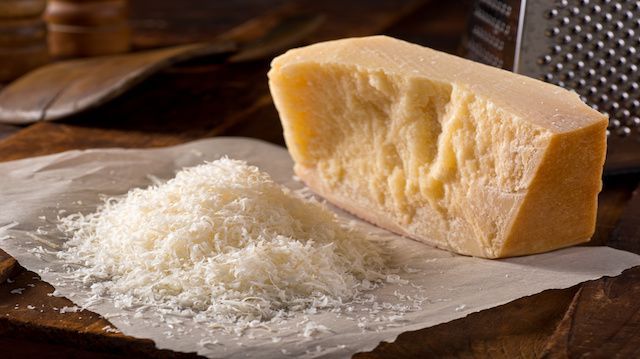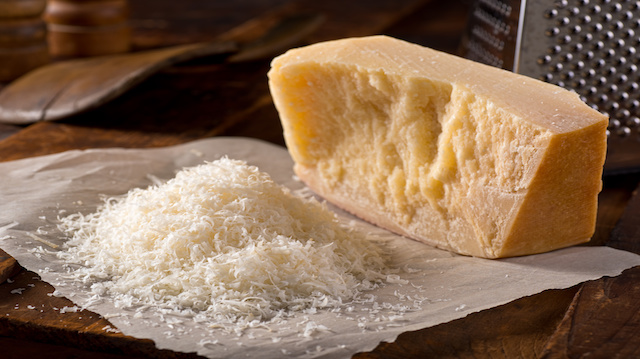
Cheese is, no doubt, a delicious addition to many dishes. If you get a high-quality, organic cheese, it can have a lot of health benefits, too. These include calcium, anticarcinogenic conjugated linolenic acid (CLA), and vitamins A, D, E, and K2.
However, many of the cheeses you’ll find on grocery store shelves — even those claiming to be 100 percent cheese — may not be the real thing.
Recently, Bloomberg News decided to conduct an independent test of grated cheeses. Their test centered around the presence of cellulose, also known as wood pulp, in common store-bought cheeses. Cellulose is sometimes added by manufacturers to sprinkled cheese products, such as Parmesan cheese, in order to save money, by “bulking up” the product.
While cellulose is considered to be a “safe additive” by the FDA, who wants to eat wood pulp? It’s certainly not an appetizing thought, and not something that really belongs in cheese — or any other food. People buying a product labeled as “100 percent cheese” deserve to get exactly that.
The results of the tests performed by the Bloomberg News team, in addition to FDA data, revealed that many “100 percent” Parmesan cheeses contained cellulose. Wal-Mart’s Great Value brand was found to contain 7.8 percent cellulose, Kraft contained 3.8 percent, and Essential Everyday Jewel-Osco brand contained a significant 8.8 percent cellulose.
Even Whole Foods’ 365 brand, which did not list cellulose on the label, was found to contain 0.3 percent cellulose. A much lower percentage — but the wood pulp was indeed there.
According to Arthur Schuman Inc., the largest retailer of hard Italian cheeses in the United States, approximately 20 percent of these cheeses produced in the U.S. are inaccurately labeled. On the matter, Schuman stated:
“Consumers are innocent, and they’re not getting what they bargained for. And that’s just wrong.”
Brad Tuttle, writing for Time magazine, explains:
“There’s no mystery as to why manufacturers use fillers rather than the real deal featured on the label. As with extra virgin olive oil, substitutes are far cheaper than the genuine article. So manufacturers can profit handsomely by duping the public—at least until they get caught.”
In 2012, the USDA tested “100 percent real Parmesan” cheese made by Castle Cheese Inc., after they received a tip that the cheese was not what it was claiming to be. Along with cellulose, it was discovered that there was no actual Parmesan in the cheese at all! It was actually a concoction of white cheddar, mozzarella and Swiss, grossly mislabeled. Lawsuits were filed, and in 2014, Castle Cheese Inc. filed for bankruptcy.
 When it comes to cheese, it seems we have to pay very close attention to what we are buying. The best option is to find a local cheese artisan, who follows organic practices, and insists on a high-quality result. If this isn’t possible, choosing an organic cheese from a reputable retailer at least assures you that there are no growth hormones in the milk used to make the cheese. Plus, organic milk has been found to have higher levels of healthy fats.
When it comes to cheese, it seems we have to pay very close attention to what we are buying. The best option is to find a local cheese artisan, who follows organic practices, and insists on a high-quality result. If this isn’t possible, choosing an organic cheese from a reputable retailer at least assures you that there are no growth hormones in the milk used to make the cheese. Plus, organic milk has been found to have higher levels of healthy fats.
Those who like to get crafty in the kitchen may wish to make their own cheese — it’s easier than it sounds! You can make great organic cheeses, and even vegan cheese, right in your own home! This way, you will know exactly what’s on your plate — no wood pulp involved!
Whatever you do, stay away from processed cheeses and “cheese products.” These are anything but healthy, and the wood pulp will be the least of your worries!
Have you ever made your own cheese? What was your experience, and do you have any cheese-making tips to share?
-Tanya Rakhmilevich
Tanya is a writer at The Alternative Daily with a passion for meditation, music, poetry, and overall creative and active living. She has a special interest in exploring traditional Eastern remedies and superfoods from around the globe, and enjoys spending time immersed in nature.
Sources:
http://www.bloomberg.com/news/articles/2016-02-16/the-parmesan-cheese-you-sprinkle-on-your-penne-could-be-wood
http://time.com/money/4226110/parmesan-cheese-fraud-wood-cellulose

